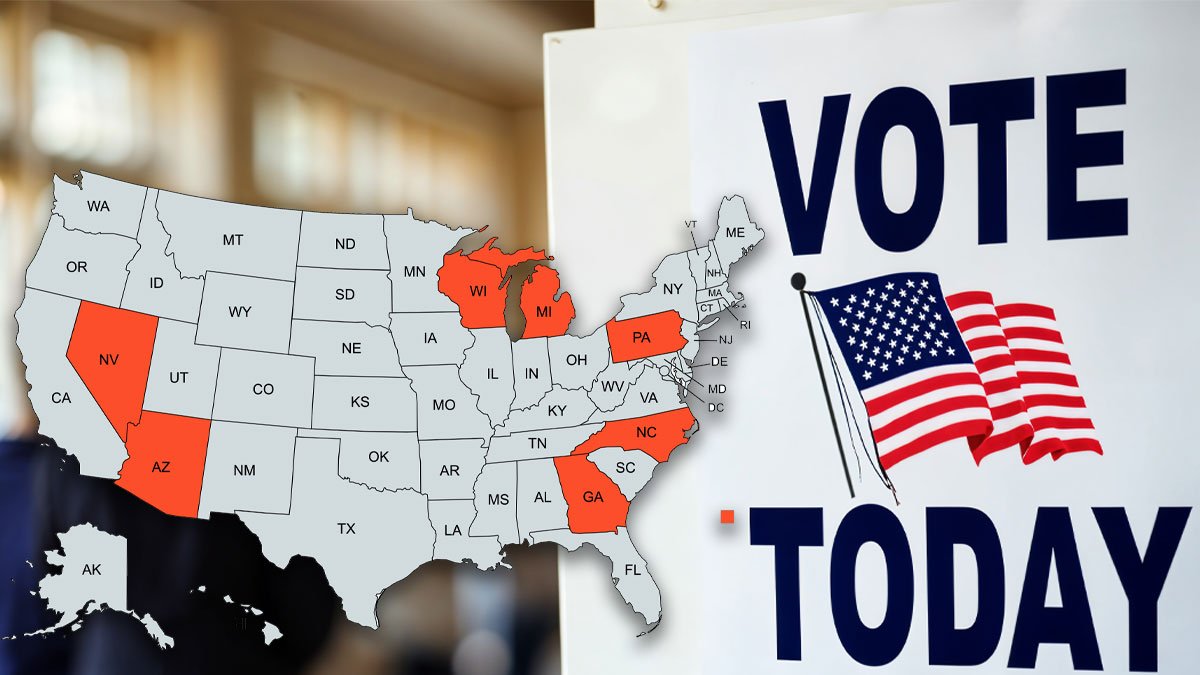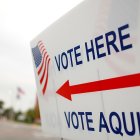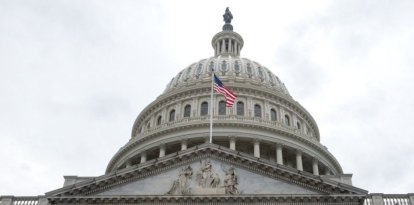The keys to voting in swing states in the presidential election
Wisconsin, Nevada, North Carolina, Georgia, Pennsylvania, Arizona and Michigan will once again be decisive, as has been the case since 2000.

The swing states
In the upcoming presidential election on Nov. 5, seven states will once again play a key role in the election of the new president of the United States. Wisconsin, Nevada, North Carolina, Georgia, Pennsylvania, Arizona and Michigan will again be decisive, as has been the case since 2000.
VOZ has compiled some facts about how to best exercise your right to vote in each of these key states.
Georgia
- Early voting began this week in Georgia. It goes until Nov. 1.
- Voters who registered to vote by mail could send in their papers as early as Oct. 7 and will have until Oct. 25 to request their ballot.
- To vote in Georgia, state law requires voters to identify themselves with some document issued by federal or state authorities that contains a photo. State ID cards, driver's licenses, passports, student IDs, military IDs or tribal IDs for Native Americans area all valid. It will be checked in the voter registry.
- Only those with ID who can also prove U.S. citizenship through the above means will be able to vote.
- Absentee ballots (excluding those covered by the Uniformed and Overseas Citizens Absentee Voting Act) must be returned by 7 p.m. on Election Day to be counted. These ballots may be returned in person, by mail or in a drop box. Polling stations for in-person voting on Election Day also close at 7 p.m.
- Georgia does not allow "ballot harvesting," whereby a third party carries the votes of others to the ballot box. It only allows certain family members or a household member to return a voter's ballot. A caregiver may also return the ballot of a disabled voter.
- Mail-in ballot envelopes contain an "oath that must be signed by the voter." Georgia also "requires the voter's driver's license number or state identification card number, which is compared to the voter's registration record," according to the National Conference of State Legislatures. If a voter is unable to sign his or her ballot, "Georgia law requires the voter to make a mark," according to the Carroll County election website. Ballots without a signature or mark are rejected, according to Carroll County.
- Any errors on ballots will have a designated period to be fixed that will be initiated at the behest of local election officials, who will contact the person concerned. The period will end on Nov. 8.

Politics
Georgia judge rules that election officials may not refuse to certify results
Joaquín Núñez
Arizona
- Arizona's in-person early voting was the first of the swing states. It began on Oct. 9 and ends on Nov. 1.
- All-mail ballots began mailing on Oct. 9. They may be mailed until 7 p.m. on Nov. 5 to enter the count.
- Polling stations for in-person voting on Election Day also close at 7 p.m.
- Only an immediate family member, resident of the same household or caregiver of a voter may cast a ballot on his or her behalf at a polling station.
- Absentee voters must sign the affidavit on the ballot envelope in order for their vote to be tabulated. The signature on the envelope must match the signature on the voter registration form.
- For identification, Arizona requires in-person voters to present one type of photo ID or two types of non-photo IDs.
- After an Arizona Supreme Court ruling, Arizonans can still register as exclusively federal voters without having to prove their citizenship.
- For correction, officials are only allowed to contact voters to correct errors in the signature that goes with their ballot. They have up to five business days from voting day to make the changes.
Michigan
- Michigan citizens can register to vote anytime until 8 p.m. local time on Election Day. They can register to vote online, by mail or in person at their local clerk's office.
- Early voting will begin no later than Oct. 26, but communities can start the process earlier, allowing it to take up to 29 days.
- Absentee ballots are available as early as 40 days before each election. Voters may request a ballot from the local clerk and may opt to receive absentee ballots prior to each federal, state and local election. Absentee voters must sign the envelope with a signature that matches the signature on their national ID or voter registration application.
- In Michigan, it is permissible for an immediate family member or a person residing in the voter's household to deliver a voter's ballot in their place. A voter may also request the clerk who cast a ballot to assist him or her in delivering the ballot.
- State government requires in-person voters to show a photo ID or sign an affidavit stating that they do not have one. Acceptable documents include a current student ID or a federal government ID such as a passport. State driver's licenses are also acceptable. Michigan does not require a copy of an ID to vote by mail.
- It is illegal for non-citizens to vote in federal elections, and voter registration forms and ballot applications require a person to attest that he or she is a citizen, but Michigan does not require documentary proof of citizenship from prospective voters.
- By law, an official must contact a voter if there is a problem with his or her signature to correct the error. This can be done until 5 p.m. local time three days after the election.
Nevada
- Nevada voters must register online and must do so by Oct. 23. Those doing so by mail must mail their letters by Oct. 8.
- Nevada also allows registration during the early voting period or on Election Day. Those who choose this option must present a valid Nevada driver's license or a state ID card. Voters will receive their ballots to vote once the registration process is complete.
- Early voting is available between Oct. 19 and Nov. 1.
- All voters listed as "active" on the Nevada voter rolls are automatically mailed a ballot in each election. Voters may request to be excluded from this mailing list.
- To vote in Nevada in person, no document proving the voter's identity is required. Election officials will simply verify that the signature on the ballot is the same as the signature on the online voter registry.
- Nevada does ask all citizens who qualify to vote. However, no Nevada law requires U.S. citizenship to vote.
- Nevada law allows for a rectification period, in which local officials are required to contact voters to allow them to correct signature problems on their vote-by-mail ballots. The voter "must provide a signature or confirmation, as appropriate, no later than 5 p.m. local time on the sixth day following the election."

Politics
Georgia election record broken: more than 300,000 votes on first day of early voting
Sabrina Martin
North Carolina
- North Carolina citizens may register to vote after the Oct. 11 deadline in person at early voting sites. That in-person early voting begins Oct. 17 and ends at 3 p.m. on Nov. 2.
- Any registered voter in North Carolina may vote by mail for any reason. Voters must request to vote using an absentee form either online or with a paper form. This year, voters must apply for an absentee ballot by Oct. 29 at 5 p.m.
- Absentee ballots must be completed in the presence of two adult witnesses who are not disqualified by other state laws. Those two individuals must write and sign their names on the application and certificate, as well as provide their addresses. Voters can also fulfill the requirement with the seal and signature of a notary public.
- Ballots must be returned before Nov. 5, Election Day, at 7:30 p.m. Only those voters with UOCAVA status (military and citizens abroad) are exempt from this rule.
- North Carolina law allows a close relative or legal guardian to deliver the ballot in the absence of another voter. In other instances where the two individuals are not related to each other, the delivery of the vote will be considered a felony.
- To vote in person, voters must present an ID. If they do not have one, the voter will have to complete an identification exception form and vote provisionally, or vote provisionally and return to their county election office with a valid ID before the canvass in their county. Those voting by mail will be required to show their ID when turning in the envelope.
- There are a number of very specific exceptions in the state of North Carolina whereby a voter is exempt from showing an ID in the above scenarios. These exceptions range from having been a victim of a natural disaster in the 100 days prior to the election or the objection to being photographed on religious grounds.
- North Carolina law requires U.S. citizenship to register to vote. However, citizenship documents are not required to register.
Pennsylvania
- In Pennsylvania, anyone with a driver's license who is eligible to vote is automatically registered to vote. Otherwise, residents will have until Oct. 21 to do so manually.
- To vote by mail or vote early, voters can go to their county elections office, receive a vote-by-mail ballot, vote and mail this ballot. The deadline to register to vote by mail is Oct. 29.
- In-person voting begins as soon as counties start mailing ballots, but that date is different in each county. Each county announces separately when it can proceed.
- Voters must turn in their own ballots. There are some exceptions for disabled voters to designate someone, in writing, to do so in their place, All other forms of "ballot harvesting" are prohibited, even among immediate relatives.
- To identify themselves when registering, voters must provide the number of their driver's license or the last four digits of their Social Security number.
- When voting in person for the first time, voters must identify themselves. However, it does not necessarily have to be with a photo ID. It can be through a bank statement and another document containing their data and residence address. After this first time, the voter is entered in a register.
- To register to vote, one must be a U.S. citizen and a resident of Pennsylvania at least 30 days before the election.
- The rectification periods will depend independently on each individual county.
Wisconsin
- In Wisconsin, voters may register to vote on Election Day. For voting by mail, however, the deadline was Oct. 16.
- Counties can offer early voting from Oct. 22 through Nov. 3, although dates and times vary.
- Absentee ballots begin to be sent out 47 days before the November general election.
- Any type of ballot harvesting is prohibited in Wisconsin. Only the holder of the ballot may legally cast a ballot at the polls.
- All absentee voters must sign and seal the ballot certificate envelope. A witness must also sign the envelope and include his or her address. Ballots that do not include the required information will be rejected.
- Those voting in person will need to identify themselves with a photo ID. No other document is valid for voting.
- By law, only United States citizens may vote in Wisconsin, as outlined in the state Constitution. However, proof of citizenship is not required when voting in the state.
- In Wisconsin, there is controversy surrounding voting submission errors. In February of this year, the state Elections Commission voted that mail-in ballots that have some incorrect data regarding the voting witness may be accepted. This was following a Dane County Court ruling on the issue. However, election officials cannot modify or add anything to a ballot, which is considered illegal. Donald Trump alleged after the 2020 election that there was fraud in the state of Wisconsin, but the accusations went nowhere.





























